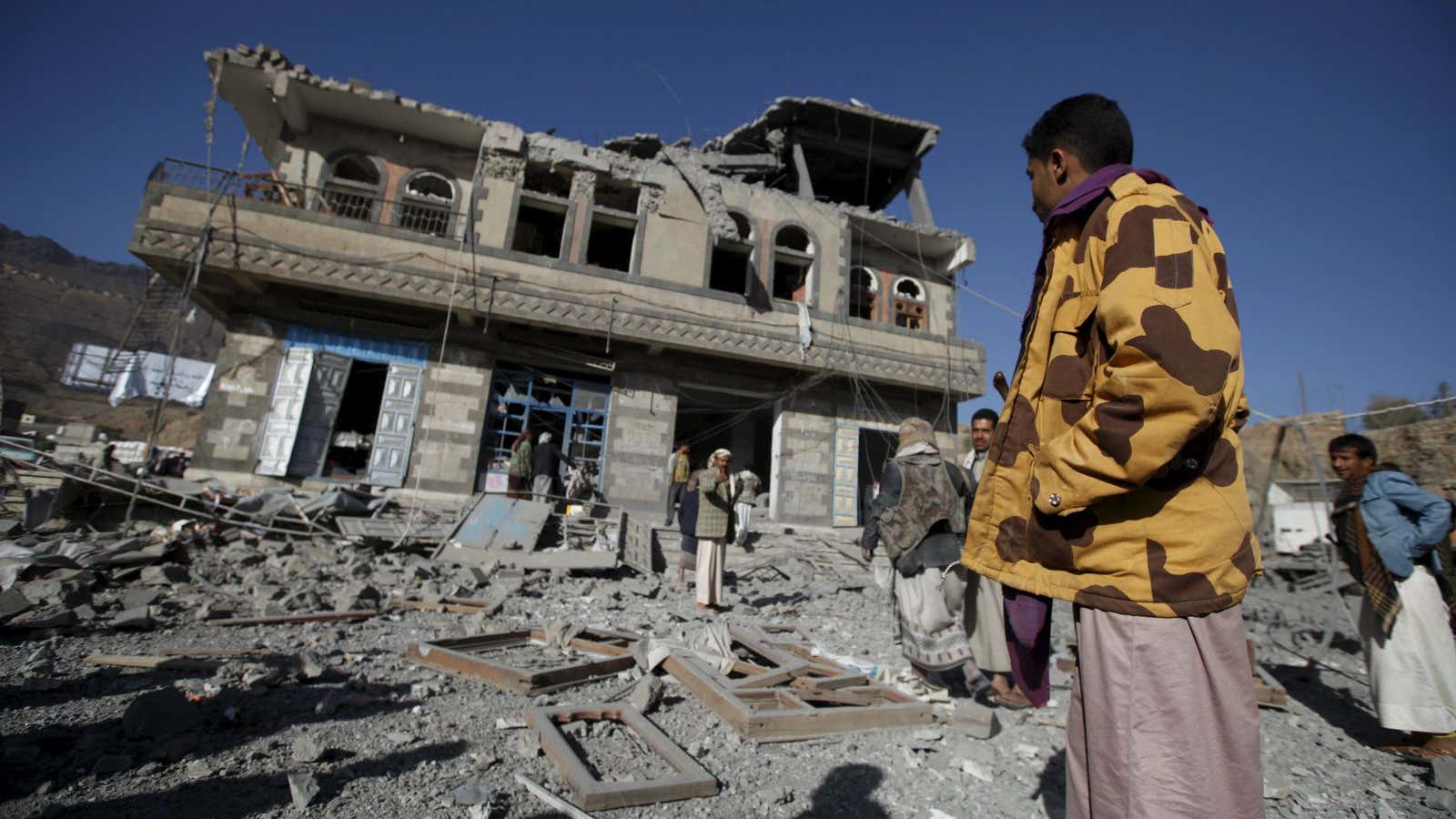Of the two things Saudi Arabia did on Jan. 2 to make the world a more dangerous place, one has caught all the attention: the execution of the dissident Shia cleric Nimr al-Nimr. That led to the fire-bombing of the Saudi embassy in Tehran, and Riyadh’s retaliatory decision to break off diplomatic ties.
The other, however, has gone almost unnoticed: the formal ending of a poorly-observed truce in Yemen, and new airstrikes by a Saudi-led coalition of Arab states against Shia rebels known as the Houthis.
Much of the analysis following the events of the weekend has focused on fears that the Saudi-Iranian conflict will derail peace talks on Syria (paywall), where Iran backs president Bashar al-Assad and Saudi Arabia backs opposition rebels. Indeed, the talks planned for later this month may not now happen at all. But the consequences for Yemen are no less dire.
Yemen’s civil war, raging for nearly a year, seems fated to constantly be drowned out by tumult elsewhere in the region. (When it does get some press, headline writers inevitably label it the “forgotten war.”) Nearly 3,000 civilians have been killed in the fighting, the country’s already fragile economy has been shattered, and attempts at negotiated settlement have gone nowhere. The resumption of airstrikes by the Saudi-led coalition—which enjoys US support—means the impoverished nation at the foot of the Arabian Peninsula is not likely to find peace anytime soon.
The conflict in Yemen is fiendishly complicated, with interlocking local resentments—tribal, territorial, political and historical—at play. But what makes these grievances much harder to resolve is that it is also a proxy war between Islam’s great powers, Iran and Saudi Arabia, under their respective sectarian banners of Shia and Sunni Islam.
Not complicated enough for you? Try this: the sectarian divisions are in themselves unclear. The Houthis are nominally Shia, as are their backers in Tehran, but their variant of the faith, known as Zaydi Islam, is different from the Iranian “Twelver” version. Many scholars argue the Zaydi branch is closer to Sunni Islam than Shiism; indeed, in the Yemeni civil war of the 1960s, the Saudis backed the Zaydis. This time Saudi Arabia is backing the Yemeni government, but its president, Abd-Rabbu Mansour Hadi, is hardly a natural Saudi ally; he comes from southern Yemen, long a bulwark against Saudi influence. Yet Riyadh seems to regard Hadi as the only alternative to the Houthis, whom it has come to see as Tehran’s catspaw.
Iran’s view is less clear. It has given the Houthis some backing, but is not nearly as invested in the country as it is in Syria, Lebanon, or Iraq. As Iranian proxies go, the Houthis are hardly in the league of Lebanon’s Hezbollah or Palestine’s Hamas. Indeed, late last fall, some analysts reading the tea-leaves in Tehran were convinced Iran was looking for a way to disengage from Yemen.
But with Saudi-Iranian tensions now escalating rapidly—Riyadh is pressing other Sunni-led states to join a diplomatic boycott of Tehran—Iran will likely reassess its role in Yemen. In Tehran last month, well-connected military analysts told me the regime regarded Yemen as a low-cost way for Iran to keep Saudi Arabia pinned down in its own backyard, draining its military resources, and damaging the ruling family’s credibility, at home and abroad. Many Western analysts agree that Yemen has become a quagmire for the Saudis.
But there are dangers, too, for the wider world. Thriving in the chaos created by the civil war are two terrorist groups with international ambitions: the well-established al-Qaeda in the Arabian Peninsula (AQAP), and the newcomers of ISIL. The collapse of Yemen’s internal security apparatus has allowed ISIL to spread quickly, with a string of high-profile attacks; in December, it claimed responsibility for a car-bombing that killed the governor of Aden and several of his bodyguards. Some of these gains have come at the expense of AQAP, forcing the older group to reassert its dominance. A fresh wave of AQAP attacks on Aden has forced authorities there to impose a nighttime curfew.
All of this means greater tragedies will be visited upon the Yemenis in 2016. Perhaps the greatest of them is that it will continue to be lost in the din of other conflicts.




